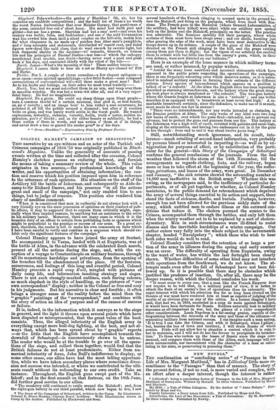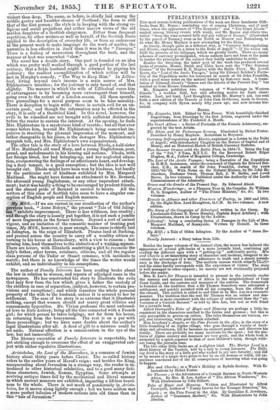NEW NOVELS. * THE continuation or "concluding series" of "Passages in
the Life of Mrs. Margaret Maitland," has in Lilliesleaf little more re- semblance to the "Passages" than that of manner. The story of the present fiction, if not so real, is more varied and complex, with an effort after a deeper interest, though the interest is rather
• Lilliesleaf : being a concluding Series of Passages in the Life of Mrs. Margaret Maitland of Sunnyside. Written by Herself. In three volumes. Published by Hurst and Blackett.
My MBS. : a Tale of Olden Islington. By the Author of "Anne Boleyn." rub - tithed by Hope and Co. Family Interests: a Story taken from Life. Published by Hope and Co. Aristobolue, the Last of the Maccabees : a Tale of Jerusalem. By U. Names& In three volumes. Published by Newby.
violent than deep. The scene, as before, is chiefly laid among the middle gentry and humbler classes of Scotland ; the form is still that of the first person; the style is in keeping with the strong re- ligious and social prejudices and rather narrow views of the old maiden daughter of a Scottish clergyman. Either from frequent repetition, by other writers as well as herself, of the Scottish Doric applied to the description of everyday life, or from an endeavour in the present work to make language do the work of matter, the narrative is less effective in itself than it was in the "Passages." There is a feeling of mannerism throughout the book, and the manner at best was somewhat "slow."
The novel has a double story. One part is founded on an idea which was pretty well worked through a good portion of the last century, that a fickle husband might be reformed by piquing his jealousy ; the readiest exemplification of which notion will be met in Murphy's comedy, "The Way to Keep Him." In Lilies- leaf, living beyond one's income is a main source of Mrs. Elphinstone's troubles; for the jealousy is only heard of, and that slightly. The manner in which the wife of Lilliesleaf cures him of extravagance is by becoming more extravagant than himself, going even to the extent of a London season. All these specula- tive proceedings for a moral purpose seem to be false morality. There is deception to begin with ; there is certain evil for an un- certain good; and though the reformation may be effected in the story, it is only of a theatrical kind. In this novel, however, the evils to be remedied are not brought with sufficient distinctness before the reader to sustain the interest. At the opening, he finds Mrs. Elphinstone in a mysterious kind of trouble ; but all that ever comes before him, beyond Mr. Elphinstone's being somewhat im- pulsive in receiving the pleasant impression of the moment, and rather changeable in his plans, is the dowager Mrs. Elphinstone's snappish talk, and Mrs. Elphinstone's own expensiveness. The other tale is the story of a love between Rhoda, a half-sister of Mrs. Maitland's old ward Mary, and a young Englishman, poor, proud, and melodramatic in his bearing and notions. Rhoda, with her foreign blood, her bad bringing-up, and her neglected educa- tion, overpowering the feelings of an affectionate heart, and develop- ing a fiery temper, is a good conception ; but the idea is not well brought out. Rhoda might have been won by kindness, but hardly by the particular sort of kindness exhibited by Mrs. Margaret Maitland. She might have formed an attachment to Mr. Bernard, the aforesaid young Englishman,- or any other imprudent attach- ment; but it was hardly a thing to be encouraged by prudent friends, and the absurd pride of Bernard is carried to mania. All the writers of this class of Scottish tales seem to have a singular con- cgtion of English people and English manners.
My we are correct in our recollection of the author's
previous book, "Anne Boleyn," the present" Tale of Old Isling- ton" exhibits improvement. There is less wildness, less crudity ; and though the story is loosely put together, it is not such a jumble of mere fragments as the former fiction. Beyond a sort of animal vigour' and an imitation of the romantic manner of treating past times, Ilfy MSS., however, is poor enough. The scene is chiefly, laid at Islington, in the reign of Elizabeth. Pirates land at Barking, and proceed across the country to carry off a wealthy citizen re- turning to his house at Barnesbury, with a vie* to ransom ; but missing him, lend themselves to the abduction of a waiting-Iv...man. There are lovers, with Elizabeth contriving a—Pito reconcile the lady's father, other lovers, retainers, citizens, and all the regular class persons of the Tudor or Stuart romance, with incidents to match ; but there is no knowledge of the times the writer would exhibit, and no individuality in his conceptions.
The author of Family Interests has been reading books about the law in relation to women, and reports of adjudged cases in the newspapers. He has constructed his story to illustrate the evils that may flow from the law which gives a father the custody of the children in case of separation, (subject, however, to certain pro- visions and exceptions); and which transfers the whole personal property of the wife to the husband, unless it is secured to her by settlement The case of his story is so extreme that it illustrates nothing, except that women should not marry great villains and consummate hypocrites. Mr. Vivian professes the most unbound- ed love to Kate Aubrey, being all the time connected with a French girl; for which person he takes lodgings, not far from his house, on returning from the honeymoon. The rest is on a par with these proceedings ; but we have some doubts about the author's legal illustrations after all. A deed of gift to a mistress could be set aside. Natural affection is a consideration in the eye of the law, but not immorality. The literary execution of Family Interests is respectable, but not striking enough to overcome the effect of an exaggerated sub- ject with rather repulsive illustrations.
Aristobolus, the Last of the Maccabees, is a romance of Jewish history about thirty years before Christ. The so-called history refers to the earlier years of Herod's reign ; and besides the King, masquerading about Jerusalem in a strange way, the reader is in- troduced to other historical celebrities, and to a good many ficti- tious characters, Jewish, Roman, Egyptian. Some attempts at reviving antique times fail by the mechanical and literal manner in which ancient manners are exhibited, imparting a lifeless heavi- ness to the whole. There is not much of ponderosity in Aristo- bolus, for it moves along lightly enough ; but we have seldom met a more perfect infusion of modern notions into old times than in this "tale of Jerusalem."

























 Previous page
Previous page